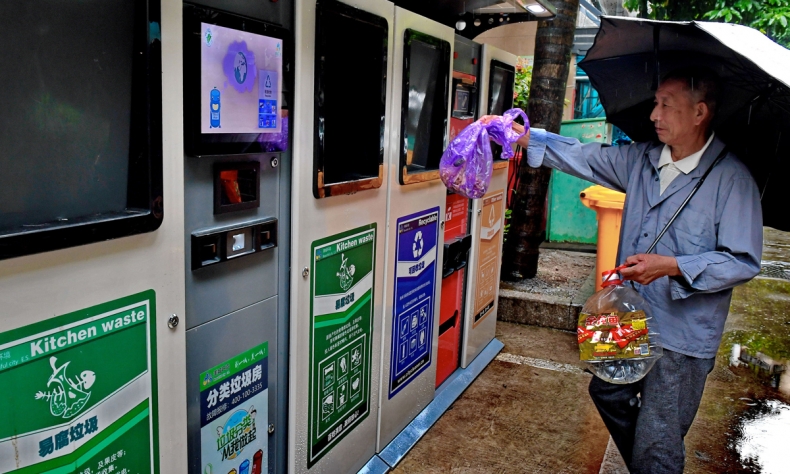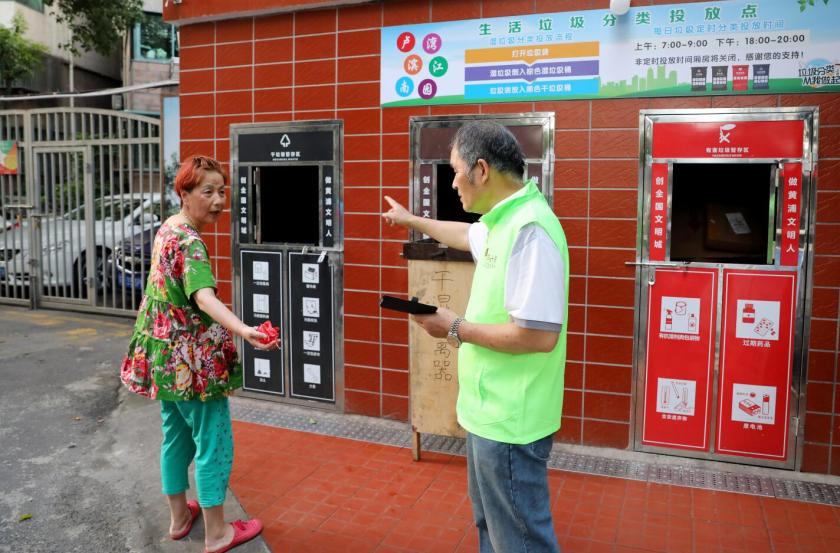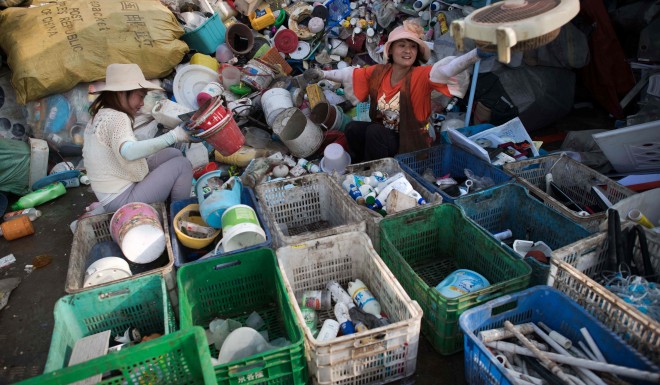
War on Waste Begins in Shanghai
According to the new regulations which came into effect July 1, residents of Shanghai — who total more than 23 million people — must arrange their garbage according to the officially published sorting method.
“What kind of garbage are you throwing away?”
Such is a special greeting heard by most Shanghai citizens in the moments before they throw away their garbage, under the witness of volunteers at household waste disposal sites located across the city. By a hilarious coincidence, this greeting sounds similar to the phrase, “What kind of garbage are you?” in Shanghainese. Bizarre as it may seem, this is likely to be a nationwide dialogue very soon, as China rigorously endeavors to popularize compulsory separation of garbage in up to 46 cities across the country. The number of cities, according to many advocates, is set to surge as garbage sorting becomes a long-term environmental undertaking practiced across the Chinese mainland. The efforts of the eastern Chinese metropolis of Shanghai are just the start.
According to the new regulations which came into effect July 1, residents of Shanghai — who total more than 23 million people — must arrange their garbage according to the officially published sorting method. What’s more, people are required to throw away their garbage at a fixed time and place with the assistance of government-recruited volunteers. Those who fail to sort their garbage properly may now face a fine of 200 RMB (about $29). Businesses, big or small, can also be fined up to 50,000 RMB (more than $7,200) if they do not effectively manage their waste.

Citizens of Shanghai, and admittedly many who are closely watching Shanghai’s high-sounding undertaking, immediately expressed dissatisfaction and skepticism towards the rigid new policy. However, one can hardly dismiss such unsupportive feedback, as no Chinese city has ever before adopted any effective policy when it comes to garbage sorting, despite numerous attempts.
Compared to its neighbor countries like Japan and South Korea, the implementation of civic garbage sorting policies in China has been woefully ineffective. Very few cities or towns have developed systematic solutions for garbage sorting among ordinary households, and what’s more, ordinary residents have failed to develop a sense of responsibility when it comes to garbage separation. What might be a surprising fact to many, however, is that China did launch a nationwide tentative policy in regards to garbage sorting and waste recycling almost two decades ago, with the initiative beginning in the early 2000s, not to mention sporadic attempts carried out by various levels of government and provinces, dating back to the 1950s.
What makes the previous attempts of the Chinese government, if not feckless, frustrating? It’s never easy to jump to a simple answer considering that China is, in any capacity, a nation of astounding complexity. With a fast-growing population vastly exceeding the capacity of its natural and societal resources, it would be quixotic for China to simply follow the example of Japan, South Korea or developed countries in the West. In effect, this may help explain the seemingly acid attitude among some Chinese towards the recent round of the garbage revolution. At the same time, it is clear that the Chinese government, albeit under tremendous pressure, is taking the issue very seriously this time.
And why not? According to Reuters, China is now in the sixth year of its “War on Pollution”, which was designed not only to clean up its skies, soil and water but also comprehensively utilize resources, including waste. True, it would be grossly negligent to dismiss China’s progress during the past few years, since environmental improvement here is self-evident. But that doesn’t obviate the need to acknowledge the pervasive inadequacy of such efforts — perhaps this is where the discussion of garbage-related topics echoes.
A simple look at the embargo on solid waste imports implemented last year may help us gain a finer understanding of the issue. Starting January 1, 2018, China banned the imports of up to 24 kinds of solid waste including plastics, waste paper and textile materials. After putting itself on the list of the world’s largest importers of garbage for decades, China’s aggressive action overtly signals its ambition to solve the problems brought by its somewhat morbid reliance on useful resources extracted from imported waste.
Historical data only makes this trend even more worrying. For more than 10 years, China has single-handedly imported 45 million tons of solid waste from the global market annually, the volume of which takes up some 56% of the world’s total solid waste each decade. For China, garbage imports used to be a lucrative business, often with profits of more than 400%. But profit wasn’t the only outcome. With a lack of advanced techniques in garbage sorting, resource recycling and waste incineration, China has had to suffer torturous environmental damage after importing an egregious amount of foreign garbage. Further, thanks to the influence of importing solid waste — together with many other types of pollution that have accompanied the country’s decade of rapid GDP development — China has been the notorious archetype of air- and environment-related issues in the popular Western media narrative. Hence, foreseeable pressure notwithstanding, China’s determination to ban waste imports appear surprisingly firm.
With solid waste imports now banned, China is looking for ways to wage war on household-generated garbage. Yet to require all residents to sort garbage at home doesn’t seem a wise choice at first glance — much less an economically-feasible solution per se. In fact, according to Japan’s experience, meticulous garbage separation actually does make it more time- and energy-consuming to transport. Then why does China knowingly take on this endeavor in this way?

The clue lies in the dominant doctrine of China’s refuse disposal, of which there are three fundamental principles: reduce the total amount of local waste, convert solid waste into reusable resources and maintain bio-safety standards. In the past, the garbage-disposal habits of most Chinese people have appeared polluting and haphazard. Such misguided habits make these recent undertakings a daunting challenge for China’s waste treatment industry, which resulted in a voracious demand for workers, lower efficiency and less secured bio-safety maintenance when it comes to dealing with mountains of randomly mixed garbage. In this, endeavors to require the entire society to participate in such waste treatment undertakings might seem promising, no matter how convoluted the process may seem to ordinary people during its teething phase.
However, not everyone has been caught off balance by the new policy. Astute Chinese businessmen have long since proved themselves champions of impressive business acumen and outstanding marketing savvy. Specially designed garbage cans and bags have quickly occupied advertising banners seen recently across Chinese social media, and a large number of custom-designed smartphone applications have been developed to help users sort their garbage properly. Some even offer services in which experts visit people’s homes in order to assist families in waste sorting. At the same time, schools are fairly receptive to the new policy. According to municipal education commissions in major cities like Beijing and Shanghai, environmental protection and waste separation education has already been integrated into pre-school education, in the hope of cultivating civic awareness for the future.
For Shanghainese who suffer the problem that every item of daily waste is now under careful scrutiny before it is thrown away, it remains too idealistic to look only to the distant future while overlooking the challenges of here and now. But as the next 45 Chinese cities pay close attention to this stoic pioneer, and with the eyes of the entire world on China’s strongest-ever assault on garbage issues, and with a reasonable amount of skepticism from both the domestic public and the global observers, Shanghai needs to pave the way forward, no matter how difficult the challenge proves to be.
 Facebook
Facebook
 Twitter
Twitter
 Linkedin
Linkedin
 Google +
Google +










